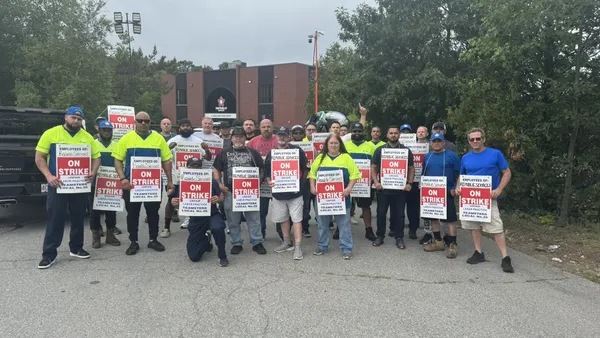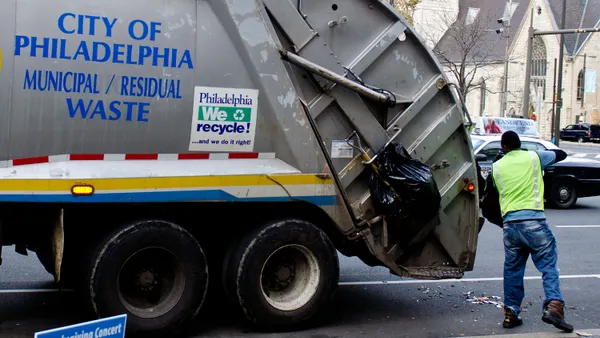Dive Brief:
- CEO Jim Fish indicated Waste Management will continue to bet big on converting its fleet from diesel to compressed natural gas (CNG) in comments at the company's annual Phoenix sustainability forum. "By the end of the year, almost 70% of our trucks on the road will run on CNG, and by the end of next year it will be almost 75%," he said at the Jan. 30 event.
- An estimated 65% of the company's fleet currently runs on CNG and about one-third of those vehicles are powered by renewable natural gas (RNG), according to Fish. He described this effort as a "big part" of reaching Waste Management's 2038 greenhouse gas (GHG) emissions offset target.
- As of spring 2017, an estimated 44% of Waste Management's fleet was CNG. While other competitors are also investing in the technology, a December 2019 report by investment firm Stifel estimated the industrywide average for CNG adoption remains around 20%.
Dive Insight:
Waste Management's 10th annual sustainability forum, hosted in conjunction with its sponsorship of the Phoenix Open golf tournament, was a continuation of the company's effort to be a "thought leader" in the industry around environmental and social topics. While the value of such a showcase may be rising amid investor interest in climate issues, it's often still hard to gauge exactly what this event means in terms of business strategy compared to other large competitors.
Fleet investment is one tangible metric showing how Waste Management plans to mark progress on its pledge to offset four times the amount of GHG it generates from operations. According to the company's latest sustainability update, 2018 fleet emissions were down by 30% against a 2010 baseline. Waste Management seeks to hit a 45% reduction by 2038.
When asked by Waste Dive at last year's forum whether a 2038 GHG offset target was too far off, given the urgency of most climate projections, Fish specifically pointed to fleet investment. The company replaced approximately 10% of its 18,000 truck fleet in 2018 and was on track to do the same in 2019, which he said "speaks to our urgency." Scientists and environmental groups, however, have argued CNG still contributes to global warming and poses problems as a fuel.
Compared to other large competitors, Waste Management is by far the most active in emphasizing CNG. Republic Services reported about 20% of its fleet being "powered by natural gas" through 2018. Waste Connections reported using CNG for 11.3% of its routed trucks and GFL Environmental was at 13.6% CNG for its solid waste collection fleet. Advanced Disposal Services reported a 19% CNG fleet, which could temporarily skew Waste Management's fleet percentage downward if it receives antitrust approval to acquire the company.
Companies have been investing in CNG vehicles for years, especially in urban areas where access to fueling infrastructure is more common. The trucks have clear maintenance savings as compared to diesel, after the initial payback period, and operators can also find additional benefits by using RNG from their own landfills. Yet, as noted in the Stifel report, it's now seen as increasingly likely the industry could reach 50% electric vehicles (EV) before it hits 50% CNG.
"If EV can get the truck capital cost down and hours of service (HOS) costs in line with CNG and diesel, the fuel and maintenance savings would dwarf both diesel and CNG," reads the report.
Fish and others in Waste Management's leadership team have said before they don't think a 100% CNG future is likely anyway, given challenges with fueling infrastructure in more rural areas, but as of now they remain committed to this path. While others will be piloting electric collection vehicles this year – including Republic Services, New York's Department of Sanitation and possibly the Los Angeles Bureau of Sanitation – the industry giant has made no such pledge.
As electric collection vehicles become more common both domestically and abroad, given mounting attention on how fleet emissions factor into climate change, the question is likely to keep coming up. Asked about the potential of electric vehicles generally during the WasteExpo investor summit last May, Fish remained skeptical about how quickly they could overtake the marketplace.
“It’s not going to surpass gasoline vehicles in my lifetime probably," he said, while leaving room to change course. “If a better technology comes along, we can turn on a dime."










